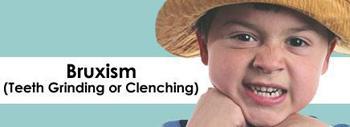
What is bruxism?
- Bruxism is a medical term for teeth grinding or the clenching of the jaw.
- Many children are said to have bruxism, but usually grow out of it by early adulthood.
- Bruxism usually happens while children sleep or when they are under stress.
What happens when bruxism is not treated?
- If bruxism goes untreated it can wear down tooth enamel, chip teeth, increase temperature sensitivity and can cause severe facial pain and jaw problems.
How can bruxism be treated?
- Bruxism usually goes away as the child gets older, but a combination of observation of the child and dentist visits can help keep the problem in check while it is still there.
- Children do not experience pain like most young adults due to grinding. If young adults are experiencing pain, their dentist can prescribe a night guard.
- A night guard is usually only prescribed after the child has lost their baby teeth.
When do children experience bruxism?
- Usually the grinding starts around age 5, when the new “stress” of starting school begins. It happens again in the early teenage years and again into late teen/early adulthood. At this time if it has not stopped, a nightguard is recommended.

